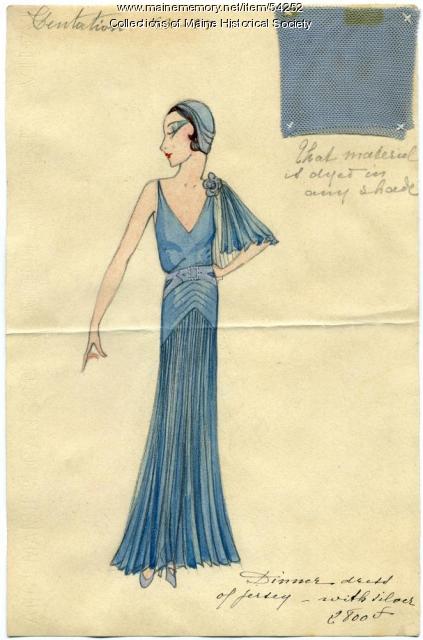Keywords: US Customs House
- Historical Items (3)
- Tax Records (0)
- Architecture & Landscape (0)
- Online Exhibits (16)
- Site Pages (6)
- My Maine Stories (3)
- Lesson Plans (0)
Online Exhibits
Your results include these online exhibits. You also can view all of the site's exhibits, view a timeline of selected events in Maine History, and learn how to create your own exhibit. See featured exhibits or create your own exhibit
Exhibit
The Barns of the St. John River Valley: Maine's Crowning Jewels
Maine's St. John River Valley boasts a unique architectural landscape. A number of historical factors led to the proliferation of a local architectural style, the Madawaska twin barn, as well as a number of building techniques rarely seen elsewhere. Today, these are in danger of being lost to time.
Exhibit
Cosmopolitan stylings of Mildred and Madeleine Burrage
Born in Portland, sisters Mildred Giddings Burrage (1890-1983) and Madeleine Burrage (1891-1976) were renowned artists and world travelers. Mildred's experiences studying painting in Paris and Italy, and the sisters' trips to Mexico and Guatemala inspired their artwork and shared passions for cosmopolitan and stylish attire. Housed at Maine Historical Society, The Burrage Papers include selections of original advertising drawings called "line sheets" from Parisian fashion houses dating from 1928 to 1936. Images of Madeleine's gemstone jewelry and Mildred's artwork accompany intimate family photographs of the sisters.
Exhibit
Maine Eats: the food revolution starts here
From Maine's iconic lobsters, blueberries, potatoes, apples, and maple syrup, to local favorites like poutine, baked beans, red hot dogs, Italian sandwiches, and Whoopie Pies, Maine's identity and economy are inextricably linked to food. Sourcing food, preparing food, and eating food are all part of the heartbeat of Maine's culture and economy. Now, a food revolution is taking us back to our roots in Maine: to the traditional sources, preparation, and pleasures of eating food that have sustained Mainers for millennia.
Exhibit
Wired! How Electricity Came to Maine
As early as 1633, entrepreneurs along the Piscataqua River in southern Maine utilized the force of the river to power a sawmill, recognizing the potential of the area's natural power sources, but it was not until the 1890s that technology made widespread electricity a reality -- and even then, consumers had to be urged to use it.
Exhibit
Evergreens and a Jolly Old Elf
Santa Claus and evergreens have been common December additions to homes, schools, businesses, and other public places to America since the mid nineteenth century. They are two symbols of the Christian holiday of Christmas whose origins are unrelated to the religious meaning of the day.
Exhibit
Several Mainers have run for president or vice president, a number of presidents, past presidents, and future presidents have had ties to the state or visited here, and, during campaign season, many presidential candidates and their family members have brought their campaigns to Maine.
Exhibit
Northern Threads: Early Republic era Fashion dolls
A themed exhibit vignette within "Northern Threads Part I," featuring Early Repulic-era (ca.1780-1820) fashion dolls.
Exhibit
Fashion for the People: Maine's Graphic Tees
From their humble beginnings as undergarments to today's fashion runways, t-shirts have evolved into universally worn wardrobe staples. Original graphic t-shirts, graphic t-shirt quilts, and photographs trace the 102-year history of the garment, demonstrating how, through the act of wearing graphic tees, people own a part of history relating to politics, social justice, economics, and commemorative events in Maine.
Exhibit
"Twenty Nationalities, But All Americans"
Concern about immigrants and their loyalty in the post World War I era led to programs to "Americanize" them -- an effort to help them learn English and otherwise adjust to life in the United States. Clara Soule ran one such program for the Portland Public Schools, hoping it would help the immigrants be accepted.
Exhibit
These stories -- that stretch from 1999 back to 1759 -- take you from an amusement park to the halls of Congress. There are inventors, artists, showmen, a railway agent, a man whose civic endeavors helped shape Portland, a man devoted to the pursuit of peace and one known for his military exploits, Maine's first novelist, a woman who recorded everyday life in detail, and an Indian who survived a British attack.
Exhibit
Immigration is one of the most debated topics in Maine. Controversy aside, immigration is also America's oldest tradition, and along with religious tolerance, what our nation was built upon. Since the first people--the Wabanaki--permitted Europeans to settle in the land now known as Maine, we have been a state of immigrants.
Exhibit
The history of the region now known as Maine did not begin at statehood in 1820. What was Maine before it was a state? How did Maine separate from Massachusetts? How has the Maine we experience today been shaped by thousands of years of history?
Exhibit
A Riot of Words: Ballads, Posters, Proclamations and Broadsides
Imagine a day 150 years ago. Looking down a side street, you see the buildings are covered with posters and signs.
Exhibit
Begin Again: reckoning with intolerance in Maine
BEGIN AGAIN explores Maine's historic role, going back 528 years, in crisis that brought about the pandemic, social and economic inequities, and the Black Lives Matter movement in 2020.
Exhibit
For one hundred years, Acadia National Park has captured the American imagination and stood as the most recognizable symbol of Maine’s important natural history and identity. This exhibit highlights Maine Memory content relating to Acadia and Mount Desert Island.
Exhibit
This Rebellion: Maine and the Civil War
For Mainers like many other people in both the North and the South, the Civil War, which lasted from 1861-1865, had a profound effect on their lives. Letters, artifacts, relics, and other items saved by participants at home and on the battlefield help illuminate the nature of the Civil War experience for Mainers.
















